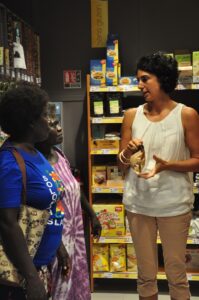
Ladies of Baniata in Solomon Islands meeting their organic Ngalinut buyer, in new Caledonia
Fair trade is an organized social movement whose stated goal is to help producers in developing countries achieve better trading conditions and to promote sustainability.
The fair trade movement seeks to promote greater equity in international trading partnerships through dialogue, transparency and respect. It promotes sustainable development by offering better trading and working conditions of marginalized producers and workers in developing countries.
The organic movement in the Pacific embraced the principles of fair or ethical trade as indivisible from the aims of organic agriculture.
The Pacific Organic Standard includes a section on social justice which seeks to incorporate the essence of the internationally recognized principles of fair trade as defined by the World Fair Trade Organization (WFTO).
WFTO prescribes 10 Principles that Fair Trade Organizations must follow in their day-to-day work and carries out monitoring to ensure these principles are upheld.
The requirements of the Pacific Organic Standard and the aims of POETCom are consistent with these:
Principle One:
Creating Opportunities for Economically Disadvantaged Producers
Principle Two:
Transparency and Accountability
Principle Three:
Fair Trading Practices specifications.
Principle Four:
Payment of a Fair Price
Principle Five:
Ensuring no Child Labor and Forced Labor
Principle Six:
Commitment to Non Discrimination, Gender Equity and Women’s Economic Empowerment and Freedom of Association
Principle Seven:
Ensuring Good Working Condition
Principle Eight:
Providing Capacity Building
Principle Nine:
Promoting Fair Trade
Principle Ten:
Respect for the Environment